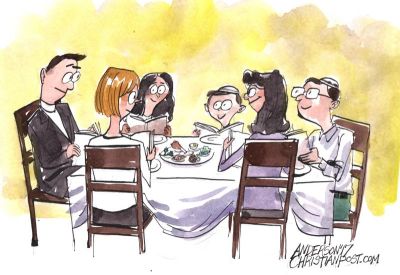This Passover, remember the Jewish communities with little to celebrate

As the season of Passover approaches, a time similar to the very first Passover is taking place in Ukraine. Tens of thousands of Jews, including some Holocaust survivors, are fleeing oppression and praying for God’s miraculous deliverance. Much of that deliverance is coming through the hands of concerned people from around the world.
Passover is typically a seven-day festival commemorating our ancestors’ escape from slavery in Egypt. But this year, in Ukraine — and for those trying to flee Ukraine — it is anything but festive.
Passover is called the “Feast of Unleavened Bread” because in biblical times Jews fled Egypt in such haste that there was no time to let the bread rise. Today in Ukraine, Jewish families are also leaving in haste, taking hardly anything in their flight to freedom. The prevailing rule is to take only the essentials — perhaps a change of clothes, some medicine, and water.
Ukrainian Jews had thought their days of suffering were over. In the 20th century, under Soviet rule, the authorities could arrest anyone in Ukraine for celebrating Passover. After the collapse of communism, Ukrainian Jews celebrated Passover openly once more.
But the liberty they have enjoyed has come to an end. As Russian troops invade — supposedly to “de-Nazify” Ukraine — Jews are once again on the run. Perhaps no other group in world history knows better about living constantly on the move than the Jewish people.
Ukrainian Holocaust survivor Vladimir Kazachinsky fled Ukraine in 1941 when the Nazis began bombing and lived in Russia for four years before returning. He recalled recently, “I was 12 years old. I remember everything well.” In the past month, his family was forced to live for 10 days in a Mariupol basement with little water or food while their neighborhood endured constant shelling, before deciding to flee.
“I would never have thought that I would be forced to go through this for a second time,” Vladimir said.
In two decades of humanitarian work, I’ve never seen such suffering and desperation as I’m seeing today. In the past six weeks, our organization, The Fellowship, has helped thousands of orphans and elderly flee from Ukraine to Israel — their ages ranging from 2 months to 94 years.
Thankfully, there is still much kindness in the world. We see it both in Ukraine and in Israel, which has been suffering through a new wave of terror attacks — and we see it in the heartening phenomenon of Christians and Jews coming together to support each other in their time of hardship and need.
In one touching act of solidarity last week, thousands of diverse people in Israel, from Christians to Orthodox Jews, turned out to mourn the death of an Arab Christian police officer killed while stopping a terrorist from shooting civilians in an orthodox Jewish town. In Ukraine, a non-Jewish Holocaust survivor who had survived the notorious Buchenwald camp was mourned by the entire world after he was killed by Russian shelling. And in the month of March, millions of dollars were raised to help Ukraine’s Jewish population — and much of these funds came from our Christian friends.
The psalmist wrote, “He will cover you with his feathers, and under his wings you will find refuge; his faithfulness will be your shield and rampart”(Psalm 91:4). Today, people are truly doing God’s work by joining together to bring food, medicine, and other essentials to Ukrainian Jews who are unable to flee their war-torn country, to facilitate Aliyah for those able to come to Israel, and to provide for those living as refugees on the borders. Just last week alone, tons of humanitarian aid were sent to Ukraine and Moldova by charities committed to helping the needy.
On top of the 30 tons of food and medicine, The Fellowship sends to Ukraine weekly, we also shipped over five tons of matzah so the Jewish community could celebrate this biblical holiday with the traditional unleavened bread!
The Passover season is rich with meaning and, this year especially, with deep appreciation. When Ukrainian mother Olga and her 10-year-old daughter Katya received food, Olga said, “You are our saviors.”
As the situation in Ukraine — a story of tragedy and tears, as well as a story of hope and heroism — unfolds, Jews are reflecting on the meaning of the first Passover, which promised freedom from slavery, from tyrants, from violence. My hope is that compassionate people from around the world will continue to help these beleaguered Jewish communities as they celebrate Passover while trying to rebuild their broken lives in unfamiliar places.
One Passover prayer states, “May your cup overflow with happiness and prosperity.” Another prayer of the psalmist states, “Do not cast me away when I am old; do not forsake me when my strength is gone” (Psalm 71:9).
Both of these prayers can be answered today. It’s up to all of us to provide those answers.
Yael Eckstein is the president and CEO of the International Fellowship of Christians and Jews (The Fellowship). In this role, Eckstein oversees all ministry programs and serves as the organization’s international spokesperson. She can be heard on The Fellowship’s daily radio program airing on 1,300 stations worldwide, and on her podcasts, Nourish Your Biblical Roots and Conversations with Yael. Before her present duties, Yael served as global executive vice president, senior vice president, and director of program development and ministry outreach. Based in Jerusalem, Yael is a published writer, leading international advocate for persecuted religious minorities, and a respected social services professional. As president and CEO of The Fellowship, she also holds the rare distinction of being a woman leading one of America’s largest religious nonprofit organizations



























